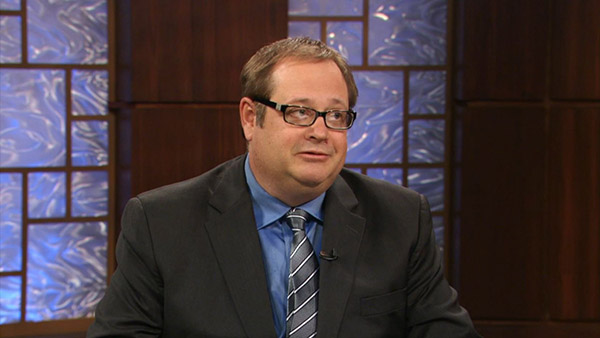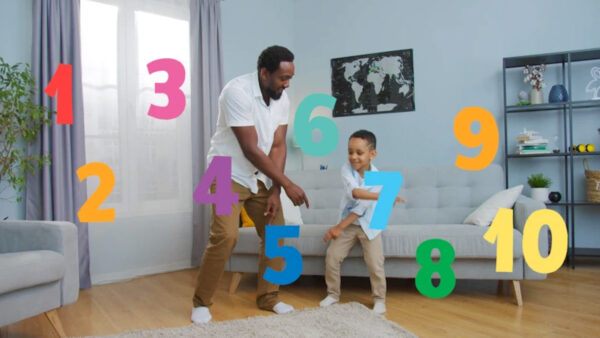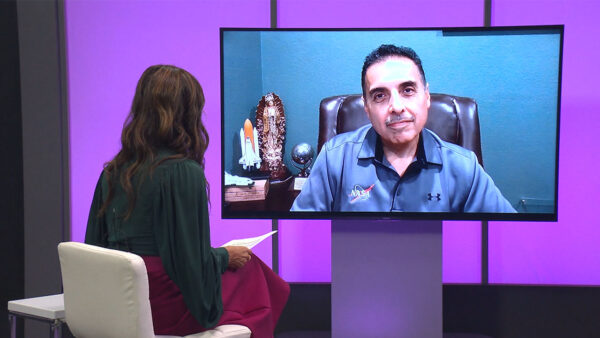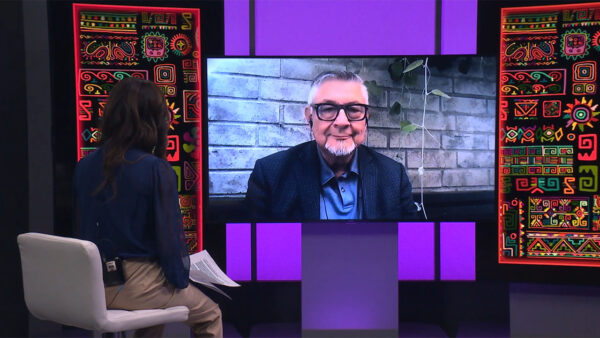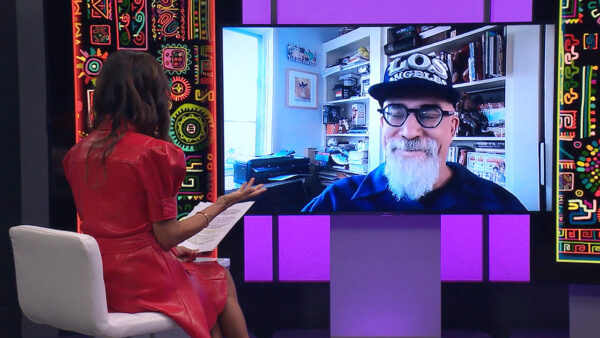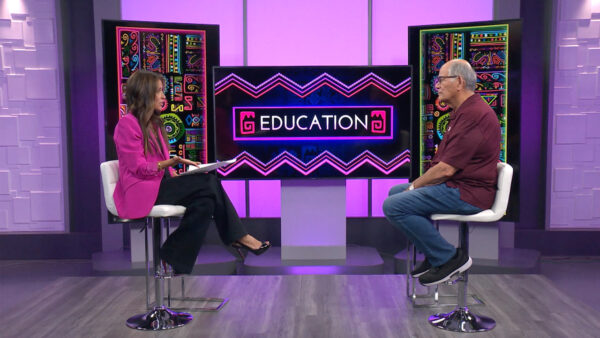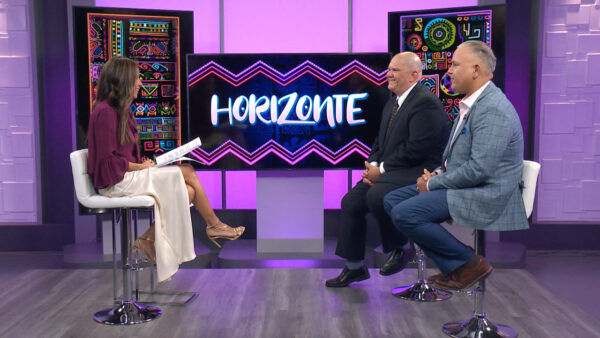A discussion of Proposition 200, which would deny certain benefits to illegal immigrants and require identification when voting and proof of citizenship when registering to vote. Guests include: Grant Woods, Prop 200 Opponent, Chairman for the group “No on 200” and State Representative Randy Graf, Prop 200 Supporter, Spokesperson for “Yes on 200.”
>> José Cárdenas:
Good evening. I'm José Cárdenas. Tonight on "Horizonte" "Horizonte" we'll hear from both sides of Proposition 200, the initiative that would require proof of citizenship when registering and going to vote and also targets denying public services to undocumented immigrants. And thousands of Latino women are in Phoenix to learn more about their own personal and professional development. Welcome to "Horizonte." You probably have seen the campaign ads on television for both sides of Proposition 200, also known as "Protect Arizona Now." On November 2nd you will decide if this controversial initiative will pass. Both sides will talk about this measure in just a moment, but first Mike Sauceda tells us more about this initiative.
>> Mike Sauceda:
An Arizona voter registration form on which it's a Class 6 felony to lie about anything, including your citizenship.
>> Joe Kanefield:
When you register to vote you have to sign the voter registration form, and when you sign that form, you're indicating -- you're providing your name, your residence address, your date of birth, your signature and also under the Help America Vote Act you are now required to check a box that indicates that you are, in fact, a citizen of the United States.
>> Mike Sauceda:
Joe Kanefield, Elections Director for the Secretary of State's Office says no documentation is required to prove citizenship and no proof of I.D. is needed when actually casting a ballot. That would change under Proposition 200, the Arizona Taxpayer and Citizen Protection Act, which is often referred to as the "Protect Arizona Now" initiative after the group pushing the proposal. The initiative would require proof of citizenship when registering to vote. Acceptable documents would be a driver's license issued after October 1st, 1996, a copy of a birth certificate, a copy of a passport, naturalization documents or various Native American identification cards. If you are already registered to vote before the passage of Prop 200, you will not be required to provide proof of citizenship unless you move to another county and register there. When voting if Prop 200 passes you will be required to provide either a photo I.D. with your address on it or two forms of I.D. with your name and address on it. Prop 200 will also affect public benefits. Right now when obtaining public benefits U.S. citizenship or legal status is required before getting benefits like standard medical coverage from AHCCS Arizona's version of Medicaid.
>> Frank Lopez:
On our application there is a place where you check whether you're a citizen or not. And then there is a statement at the bottom that you sign and attest that everything you've signed for is true under penalty of law.
>> Frank Lopez:
But we do check Social Security numbers through the Social Security Administration. So that's our I.D. check through -- for anybody. We are allowed to proceed this way. If we have any question about the answers that someone is giving, any legitimate question, then we can check citizenship further. Also if they say they've been born in another country, we check status further. Otherwise, we can't go checking just based on skin color or language or -- which would be profiling.
>> Mike Sauceda:
ACCHCS does provide emergency services regardless of a person's immigration status. Lopez says the most recent figures peg the cost of that at a projected $120 million, costs shared by the state and federal government.
>> Frank Lopez:
They can get services if they're in an emergency.
>> Mike Sauceda:
That might change under the "Protect Arizona Now" measure. Proposition 200 will create new laws applied to the state and all its political subdivisions and employees of those agencies. That includes verification of the identity of those applying for benefits and whether they are eligible for benefits. It would not allow I.D. cards to be used for identification, including the driver's license, unless the agency that issued the card has checked the immigration status of the person. The initiative states it shall be enforced without regard to race, religion, gender, ethnicity or national origin. Prop 200 will allow any citizen of Arizona to sue workers and agencies if they violate the regulation. Finally, it requires government workers to file a written report to federal immigration officials if they discover an immigration violation by anyone applying for benefits. If they do not, that employee and his supervisor could be charged with a Class 2 misdemeanor. Currently federal law prohibits state workers from reporting to federal authorities the immigration status of those applying for benefits.
>> Frank Lopez:
We're not allowed to report anything to immigration. There are a couple laws -- Social Security Act does not allow it, Civil Rights Act doesn't allow it. The Centers for Medicare, Medicaid, which oversees the Medicaid program in the country, does not allow it.
>> Mike Sauceda:
If the initiative passes, Kanefield says the Justice Department will have to review it because it makes changes to voting law and AHCCCS is still not sure how it will comply with Prop 200.
>> Frank Lopez:
There's going to be a conflict. That's where we're caught here. If we obey federal law, we'll be in violation of state law if it passes and subject to prosecution. If we obey state law, we will be subject to federal action, which could mean loss of funding.
>> José Cárdenas:
Here with us to talk about Proposition 200 is State Representative Randy Graf. Randy is also a spokesperson for Yes on Prop 200, the group pushing to pass 200. Also here is Former State Attorney General Grant Woods. Grant is the chairman of No on 200, the group against the proposition. Gentlemen, thank you for joining us on "Horizonte." Both groups have antecedents. At least initially it was "Protect Arizona Now," Kathy McKey's group that was pushing it and the opposition was Alfredo Gutierrez, Mary Rose Wilcox heading the Liberty Coalition. I want to talk quickly and then get to the meat of this, about the relationships between those groups and where you guys are. First you, representative Graf.
>> Randy Graf:
"Protect Arizona Now" is the original committee that brought forward the initiative. Once the signatures were turned into the Secretary of State's office and validated, then it became Proposition 200 and now it belongs to the citizens of Arizona to determine at the election on November 2nd. Since then "Protect Arizona Now" committee is still in effect but there are three other committees that have opened up, one here in Maricopa County called yes on prop 200, to -- basically they're all working toward the same end, to gather support for the initiative.
>> José Cárdenas:
But there was some tension between Kathy McKey and you and other others who originally had been behind this. Is that affecting the effort now in.
>> Randy Graf:
Absolutely not. I originally came on board as a senior advisor to the "Protect Arizona Now" committee but later on this spring as we were getting closer to turning in the signatures, Kathy decided to go a different direction. We developed these three other committees, one in Maricopa County, one in Pima County one out in Cochise County, all working to support and get information out, accurate information, on what this initiative is and how good it will be for the citizens of Arizona.
>> José Cárdenas:
Grant, how and why did you get involved? What happened with the Liberty Coalition?
>> Grant Woods:
The Liberty Coalition is still involved. We worked very closely together. Alfredo is one of our great leaders in this state. He's a lead inner this effort as well. I think there's a recognition that if it was simply seen as a Hispanic issue, only affecting Mexican-Americans, for example, then that would lessen it's chances of getting our message out which is is that prop 200 is bad for all Arizonans. They wanted to make sure it wasn't just pigeon holed in one area, that we had a wide spectrum of people opposing it. It isn't the same problems they had. I mean, you alluded to it. I think one of the problems -- this Kathy McKey is still everywhere. When I go places to talk about it, if Randy is not there, or another Randy, Randy pull Len, it's Kathy McKey. She's always around. One of their problems is one of her key advisors is an avowed separatist from back east. She's quoted widely and stands by her quotes that races ought to stay amongst themselves. She's not a raciest, she says. She's a separatist, everybody ought to live with their own race. Of course, I think most reasonable people disavow that, and I would think yes on 200 has disavowed that and don't really want to be associated with that, but Kathy McKey and that P.A.N. group has disassociated. On our side we're all in this together, it's firefighters, it's hospitals, it's hospital workers, it's the unions and the chamber of commerce, it's the entire congressional delegation, Republican or Democrat. It's a pretty united front in this state against Proposition 200.
>> José Cárdenas:
The congressional delegation has been on record almost from the start against this and, of course, the Liberty Coalition has been working against this for a long time. The rest of the groups, though, seem to have come to the table late and there's some concern that maybe too late. What's your comment on that?
>> Grant Woods:
Well, I think we did come to the table late everybody because we didn't know whether it was going to be on the ballot or not. There were efforts to keep it off the ballot and there was a big question until right up to the end whether it would be on the ballot, but now that it's on the ballot, I will say in the last six weeks you've seen quite a big movement, all of these groups, and I don't think you could name very many issues that that wide variety of people and organizations agree on. They've all come together. I think they're -- the number they'll end up raising is certainly over a million dollars they'll be at, somewhere between 1 and $2 million, and we've seen some movement in the polls where this started out, according to the "Arizona Republic," at 66% six weeks ago, it was now at 57% last week. 57 on their side is better than where we're at but it's not as good as 66. They're going the wrong way, we're going the right way. Is it too late? I don't think so.
>> José Cárdenas:
Randy, give us, and I'm going to ask you the same question, grant, but obviously with a different emphasis, but in a concise way, tell us why people should vote for Proposition 200, and then I want to get to some specifics.
>> Randy Graf:
The initiative does a few things. One is it is going to tighten up our election process here in Arizona. Our state constitution quite frankly says that there shall an enacted registration and other laws to secure the purity of elections. There's a lot of things in the paper right now about concerns with the elections in Afghanistan and how accurate they were. And yet we don't share those same concerns here it seems to be. So to simply require -- it's already an he will eligibility requirement that you are a citizen to vote in the State of Arizona. Nobody seems to argue much about simply having to prove that. On the front end instead -- what this initiative will do is make people prove they're eligible on the front end versus trying to identify fraud on the back end. And then picture I.D. at the polls. I think a lot of people support that. The other side dealing with title 46 and our welfare benefits. That's where a lot of confusion and a lot of misinformation has been laid out at people's doorstep. It is written into title 46 welfare. On your opening piece they talked about you had -- one of the directors for AHCCCS talking about all ramifications. Well, AHCCCS is in title 36. It's not in title 46. I do not believe this will be interpreted to span all statutes here in Arizona. It talks about the applicant. It talks about in this section. We're only talking about adding roughly 24 lines to title 46 to make sure that when people apply for welfare benefits here in the State of Arizona under current eligibility requirements that they are eligible. I mean, we're not -- we're not debating the merits of whether or not we need these eligibility requirements. Everyone agrees eligibility requirements are necessary. If an eligibility requirement includes an income level, we can't just take people's word for when it they come in and say, oh, yes, we make under the level that the legislature set. We've got to have some controls on who is eligible for these programs.
>> José Cárdenas:
Let me ask you a question, and I'm sure grant will cover this a little more thoroughly, but a lot of people are saying that what's -- you mentioned Afghanistan and so forth. The response on vot, as I understand it, is that there hasn't been any real evidence of voter fraud. So why do we need this? And with respect to welfare benefits, you already have legislation on the books would that prohibit people who aren't citizens from getting these kinds of benefits. So why do we need prop 200.
>> Randy Graf:
Once again, this is trying to put an enforcement mechanism on the front end. The concept there has not been voter fraud, I think people realize there is voter fraud going on. There's been plenty of newspaper articles. There was an interview just last week the Yuma last week where an illegal alien said they are voting and that -- but they're being tricked into voting because of early ballot measures -- early ballot requests by candidates. We know it's going on out there. It's just that when these fraudulent voting are brought to the county recorder's office and transferred to the county attorney to do any prosecution, it's not a high priority at the county attorney's office. At least I know it's not in Pima County. So none are followed through and investigated as prosecuted, they say there's no fraud. What is wrong with trying to tighten it up? We had a measure that passed the legislature in 2003 that would have simply required showing a picture I.D. card at the polls. It was passed out of the house, passed out of the Senate, the governor made it an issue and tried to make it a racial racial issue and inflame a large debate and discussion when she took it to the national association of Latino elected appeared appointed officials and vetoed it in front of the national convention that was being held in Phoenix. So this isn't a racial issue. This is about protecting citizens of Arizona and residents -- legal residents when it comes to protecting and making sure our welfare benefits that are out there for those that are eligible and for those that need it to make sure those benefits are there and they're not being diluted by people that should not be here taking advantage of these.
>> José Cárdenas:
Grant, why should people vote against Proposition 200?
>> Grant Woods:
Well, it's very poorly written and it's hard to imagine why it is so poorly written. Either the people who did it didn't know what they were doing, or they purposely wrote it this way. People can make up their own minds on that, but the ramifications of it, I think, are pretty big. As to Randy's points there, voter fraud by so-called illegal aliens is not a problem in this state. I was Attorney General in this state for eight years. I worked closely with the county attorneys and the county recorders and you can't find any of them. You can't find one county recorder or one county attorney then or now that will tell you that this is any sort of problem whatsoever in this state. Okay? As you pointed out, it's already against the law for people to get welfare benefits if they're not here legally. We're -- we are all in agreement on that. The problem is by putting this broad phrase public benefits here, Randy's confident that the courts, because that's what they have to say now, confident that the courts will construe it narrowly. We're not so confident. Now, Jose is a lawyer, and one of the finest lawyers in the state. As Attorney General I argued in front of every court in this state, and in front of the United States Supreme Court. I've been there, you guys aren't lawyers. All I can tell you is, don't be so sure that this phrase public benefits won't be construed broadly. We believe that the odds are that it will be construed broadly and if so, what does that mean? It means any public benefits, any governmental services basically, non-emergency, that the government worker is going to have to require from you your I.D. That means parks, that means libraries, that means firefighters, that means police officers, that means pretty much across the board you're going to have to carry your I.D., and not just any I.D.. Some people have said, we have 'to show our driver's license at blockbuster. They specifically say for public benefits, not voting, a driver's license is not good enough. That means you're going to carry either your papers, which doesn't sound too good to most people or your passport if you have one or a certified birth certificate. That makes Arizona a different place than it used to be. It drives up the costs of government. Our governor has estimated in each of her branches, each of her departments, what it will cost, and it's tens of millions of dollars to implement this thing that solves no problems. It doesn't prevent one person from coming across the border illegally. It also, as you can see, increases the level of intrusion in our lives as citizens. Lastly, I think it's very divisive. I think it send out a negative message out of Arizona. Some people think it's a good message, Arizona is doing something. Well, first, we're not doing anything. We do nothing bypassing 200 to keep illegal people from coming over the border, nothing. And I would defer to John McCain and our congressional delegation. Senator McCain is the leader in the fight to reform immigration. We want immigration reform. We want to have a system that works in this state, in this country. And John McCain says vote no on 200 because it was hurt efforts in Congress to try to pass something that does do something about -- something that is meaningful about immigration reform. So why should you vote against it? Because it's going to change your life as someone who is here legally and it's going to do absolutely nothing to prevent people from coming here illegally. It's divisive and it probably ultimately hurts our ability to get real immigration reform.
>> José Cárdenas:
But very quickly --
>> Randy Graf:
Very quickly, the federal quickly the federal government has done nothing on immigration reform. I think most people will agree with that, for 20 years now. And our congressional delegation actually came out in opposition to this initiative under some false pretenses put forward by one of our congressmen suggesting this was going to interfere with the guest worker legislation they have presented. There is -- obviously it was easy to determine they never read the initiative because there is no connection whatsoever between their federal immigration reform plan and this initiative. The welfare reform act of 1996 allows the State of Arizona to develop their eligibility requirements and try to enforce them and that's simply what this is doing. It's going to be determined that this deals with title 46 only because it says it right in the initiative that applying for eligibility for benefits is prescribed by this section and it talks about the applicant. So when you're applying for welfare benefits, you will be required to prove citizenship. You don't apply for benefits when you go to the City Park. You don't apply for benefits with the dog catcher when you are trying to adopt a pet at county animal control, you don't apply for benefits with the fireman when he shows up to put the fire out. Those are a bunch of red herrings the opposition put out. I think it's proof. They have certainly -- the support level from where it was last -- that fall, in January, the Republican party at our annual convention, we voted to support this three to one.
>> José Cárdenas:
Has that change?
>> Randy Graf:
Well, that was at the annual meeting. The numbers have come down a little bit as far as support level, yet the opposition numbers and the negative numbers have not increased. They've stayed in the 20, 25, 23% range.
>> Grant Woods:
You really think -- you're saying tonight here that our two senators, senator John McCain, senator Jon Kyl, and our congressman, who are Republicans and Democrats, who are liberal and conservative, that they didn't know what they were doing when they initially said vote no on 200 and that now they have, I guess, changed their mind but forgot to tell anybody. Senator McCain told the press two weeks ago at the airport that he thinks it's vitally important that people vote no, and if you want me to explain it to you, I will explain it to you. The reason is because politicians, you're a politician, okay, and I've been there, too --
>> José Cárdenas:
Short explanation --
>> Grant Woods:
Politicians like to duck the tough issues and they've ducked immigration reform. We're in agreement on that. But Senator McCain's word -- he is a lead or this, he's the guy here, you may wish it was someone else, but it's him, he says if you start having all this controversy on these sort of state initiatives that ultimately do nothing the politicians will say, you know what, the states are dealing with it and they will pass -- you may not like Senator McCain and the congressional delegation, we do like him, we do respect him, and we think they're our best chance.
>> José Cárdenas:
We'll stop there. I'll give you 20 seconds. You get the last word and --
>> Randy Graf:
This initiative with will do something. Once again, it's sending a message certainly to our elected officials at the federal level. We've gotten a lot of support from states around country, particularly in the west here, that are experiencing some of these same issues with untold growth in their welfare programs, and this is a way to control it and make sure that these programs are there and available for those that need those programs.
>> José Cárdenas:
Gentlemen, thank you both for joining us to talk about this important subject. It's opportunity to network and find out about issues affecting Latinas. Merry Lucero tells us more about what organizers are calling the largest gathering of Latinas in the country.
>> Merry Lucero:
The National Hispanic Women's Corporation is hosting the 19th Annual National hispanic Women's Conference at the Phoenix Civic Plaza. The conference is expected to attract more than 2,000 women from around the country. The goal is to provide leadership and professional development and to raise money toward scholarships to benefit young Latinas. The 2004 conference theme is Latina power. There will be a series of workshops on voter outreach, careers, literature, education and more. In the past the conference has hosted Latina authors such as Stella Pope Duarte. Women attending the conference will enhance their knowledge of issues that impact the community and directly relate to education, health and professional involvement.
>> José Cárdenas:
Joining us tonight to talk about the 19th Annual National Hispanic Women's Conference is Linda Mazon-Gutierrez, president of the Hispanic Women's Corporation. Linda, thank you for joining us on "Horizonte."
>> Linda Mazon-Gutierrez:
Good evening, Jose.
>> José Cárdenas:
Let's talk about the mission of the Hispanic Women's Conference and how it's changed over the years.
>> Linda Mazon-Gutierrez:
Basically the mission has remained totally the same. It's to bring 2000 Latinas nationally together to focus on the issues of education, professional advancement and leadership development with a secondary emphasis on scholarship awareness with our youth.
> José Cárdenas:
And what are the attendees going to get out of the conference?
>> Linda Mazon-Gutierrez:
We're offering a myriad of choices with regard to small business development, wealth building. We want to get into communication skills, be it in the business or in the workforce. Secondly the other thing that we want to do is be able to focus on education as well as the personal empowerment issues that a Latina woman needs in order to be able to succeed in her professional life as well as her personal life.
>> José Cárdenas:
What do you their the major issues facing Latinas today?
>> Linda Mazon-Gutierrez:
Let me tell you, it's pretty stark. It's very, very basic. It's education, it's the economy, it's equal pay, and most definitely it's wealth building.
>> José Cárdenas:
Now, we're in an election year, in fact, Phoenix is a hot bed this week of election year politics. What does the conference have to say to Latinas about voting and other election issues?
>> Linda Mazon-Gutierrez:
This is going to be a very powerful issue, in fact, we're going to address it on Thursday morning with the presidential race. We're going to have surrogates from both the Republican and Democratic Party talking about the issues that most certainly affect Latinas throughout the United States. But the most powerful point that we want to get across is that statistics show that over 22 million women did not vote four years ago. Suffice it to say that we believe that a large number of that group were probably Latina women. We're going to push that effort forward. We're going to entice them. We're going to get on them to make sure that they take five other women to vote and leadership in my opinion begins at home. We need to get out the Latina vote if we have to have the keys to the kingdom of power with respect to advocacy.
>> José Cárdenas:
Now, you got some very distinguished guests, honorary chair in your award recipients. Tell us about them.
>> Linda Mazon-Gutierrez:
First off, our honorary chair is Sarah Martinez Tucker, who the president and CEO of the Hispanic scholarship fund from San Francisco. She's a remarkable woman who is going to open up this conference and discuss the issue of leadership and scholarship especially with our young Latina women. Secondly, we're going to be honoring Janet Morgilla, who is now the National Director of the National Council of La Raza based in Washington D.C., a rising, rising star throughout the United States, and her own twin sister, who is right here based in Phoenix, the Honorable Judge Mary Morgilla.
>> José Cárdenas:
She was in the Clinton White House.
>> Linda Mazon-Gutierrez:
Absolutely. So we're real excited. They're twin sisters. We think they're a double whammy.
>> José Cárdenas:
Talk a little about the scholarship aspects.
>> Linda Mazon-Gutierrez:
We're just real excited about that. We have a twofold process, one where we've awarded about 25 scholarships right here with -- at Arizona State University. The myriad of scholarships and the number of degrees that they're getting in the various arenas such as medicine, pre-law, engineering, the math and the sciences, the arts, the liberal sciences, you couldn't have anything better or deeper. We will be presenting them at the scholarship program benefit luncheon on Friday and also we're going to make a very special announcement about gathering corporate and nonprofit support for LOS MEDICOS scholarship program at University of Arizona.
>> José Cárdenas:
Thank you for joining us on "Horizonte." And thank you for joining us on "Horizonte" tonight. I'm José Cárdenas. Good night. Enjoy your evening.
Randy Graf: State Representative, Spokesperson, Yes on Prop 200;
